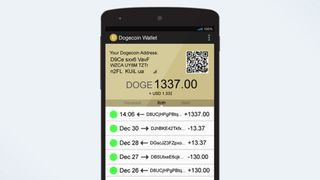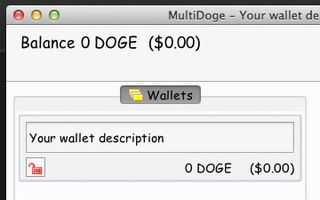The question “What is Dogecoin?” has a seemingly simple answer: put simply, it’s a cryptocurrency created in 2013 by software developers Billy Markus and Jackson Palmer as a satire of Bitcoin and the exploding popularity of crypto. But obviously there’s more to it than that.
That’s because Dogecoin is also one of the fastest-growing cryptocurrencies, having risen in value by 10,000% since the start of 2021. That’s right: if you’d invested $100 in Dogecoin back in January, your investment would now be worth around $10,000. In fact, it’s now one of the top cryptocurrency performers overall, with an estimated overall worth of more than $60 billion — making it bigger than Ford and Twitter.
Despite that growth, Dogecoin is still cheap relative to other cryptos, and that makes it an ideal option for crypto-curious investors to dip their toes in the water. Watching the price of Dogecoin fluctuate can be a good lesson for kids or noobs in how crypto markets work and prepare them for some real investing. Think of Dogecoin as the gateway cryptocurrency.
Here’s everything you need to know about Dogecoin and how it works.
What is Dogecoin?
According to its website, Dogecoin is “a decentralized, peer-to-peer digital currency that enables you to easily send money online.” That same definition could be applied to other more established cryptocurrencies including Bitcoin, Ethereum, or Litecoin.
Cryptocurrencies started gaining popularity as alternatives to traditional currency in the early 2010s. They allow money to be transferred from one person to another without using a bank, and many people believe they make for a safer and more democratic financial system. Bitcoin was launched in 2009, and today there are thousands of other “altcoins” out there. Indeed, new ones launch on a seemingly constant basis, with SafeMoon and Chia just two of the most recent.
Dogecoin has also been labelled a “memecoin,” on account of its origins — and this is one area in which it really differs from most other cryptos.
If you’re of a certain age (read: Gen Y or Z), you’ll be familiar with the slang term “Doge,” which is a misspelling and mispronunciation (“dohj”) of “dog.” The dog in question, a cute little Shiba Inu, was an internet meme sensation in 2013 that has never really gone away. Doge says all sorts of funny things that he’s thinking, using broken English and poor spelling.
The cryptocurrency that takes its name from the meme has no real use (some people use it to give small tips on social media), but it’s developed a growing fanbase helped in no small part by a raft of celebrity endorsements; more on that below.
What is the latest news about Dogecoin?
Dogecoin has had a busy few days in terms of news. On the plus side, Elon Musk’s SpaceX firm announced the DOGE-1 Mission to the Moon, in which a Falcon 9 rocket will carry a payload into Lunar orbit. What’s more, it will be paid for entirely in Dogecoin.
More negatively, Dogecoin suffered a major fall after Musk’s appearance on Saturday Night Live. The cryptocurrency had been trading at around $0.71 prior to the show, but plunged by more than 30% to $0.42 after Musk poked fun at it and labelled it a “hustle” in his hosting slot on Saturday. It’s since rallied to around $0.50, but given that beforehand pundits were predicting a major rise on the back of the appearance, it was all a bit of a disappointment.
If you’re confused by how often Musk’s name keeps cropping up in relation to Dogecoin, let us explain. The Tesla boss has long championed Dogecoin on Twitter and in interviews, labelling himself the “Dogefather”and proclaiming Doge to be the future of currency.
And every time he tweets positively about Dogecoin, the coin’s price seems to rise.
Back in January, for instance, Dogecoin shot up by over 800% in just 24 hours, inspired at least partly by a Musk tweet, this time of a picture of a Vogue magazine cover parody called Dogue.
Nor is the Tesla boss the only celebrity to back Dogecoin on social media. The likes of Gene Simmons and Snoop Dogg have also gotten in on it, while Mark Cuban, the owner of basketball team the Dallas Mavericks, has also posted regularly about it.
Last month, Cuban said the Mavericks were on track to complete 6,000 Dogecoin transactions in April, a scheme made possible via a partnership with BitPay. When asked why he was backing Dogecoin, Cuban replied that it was “the one coin that people actually use for transactions.”
Dogecoin even celebrated its own day last month. April 20 — aka 4/20, a date with particular resonance for marijuana enthusiasts was designated ‘Dogeday‘.
Plus, several popular crypto exchanges have announced support for Dogecoin in recent days: Gemini added it on Tuesday (May 4), while eToro and Webull have also started letting users purchase the currency recently.
What is the price of Dogecoin?
For years, the price of a Dogecoin remained at a fraction of a penny. It finally crossed the penny threshold in January 2021 but has since soared beyond most people’s wildest expectations.
On April 20, it reached a high of $0.41, meaning it had grown by 7600% since the start of the year. A further surge in early May saw it climb to even higher levels: it topped $0.70 at once stage, representing growth of 14,000% in 2021. While it’s now sitting at around $0.50, that’s still an impressive performance.
Dogecoin’s growth has in part been sparked by those endorsements from the likes of Musk and Cuban, but it was also talked up by Reddit users as part of the stock-price pumping campaign that included GameStop and other heavily shorted companies.
For price comparison, as of today (May 10), Bitcoin was trading at about $58,236; Ethereum at about $4,114; and Litecoin at about $393. So, with Dogecoin we’re not talking big money, but a growth of more than 10,000% is not to be sneered at and professional investors, and the media, have taken notice.
How high could it eventually go? That’s very hard to predict. Most cryptocurrencies are subject to wild changes in value from time to time, and Dogecoin more than most. Some experts predict it could rise above $1 this year, and even reach $10 eventually.
How do I buy Dogecoin?
It’s fairly easy to buy Dogecoin. These are the steps to take:
- Get a Dogecoin wallet for your desktop computer or mobile phone (e.g., Exodus, Coinbase Wallet)
- Locate your Dogecoin address
- Find a Doge exchange (e.g., Binance.us, Kraken – Note: Binance.us is only available in 40 out of 50 states, and Kraken is available in all states except New York and Washington.)
- Buy Dogecoin
- Withdraw your Dogecoin
Note also that on March 1, the cryptocurrency ATM provider CoinFlip added Dogecoin to its portfolio of available coins on its 1,800 ATMs across the U.S.
How can I invest in Dogecoin?
If you live in New York or Washington state and can’t buy Dogecoin on a crypto exchange or you just want to invest in Dogecoin the quickest and simplest way possible, you can buy “DOGE” on Robinhood, which is one of the few platforms that offer Dogecoin trading in the U.S. (Note: the product you’re buying on Robinhood is not an actual coin that you can put in a wallet or withdraw — it’s more like an “interest” in Dogecoin that acts like a stock.)
If you have a Robinhood account, simply type “DOGE” into the search (the magnifying glass) and enter the amount of money or shares you’d like to buy. (You may first have to click on an agreement because Robinhood Crypto is separate from Robinhood Financial.)
How do you use Dogecoin?
Like other cryptocurrencies, Dogecoin is used with a wallet on your laptop, your smartphone or a website. Although technically you can use it to buy goods and services, few businesses actually accept Dogecoin. (Bitcoin, on the other hand, is now accepted by many major companies, including AT&T, Microsoft, Newegg, Overstock, and Shopify.)
One of the most popular uses for Dogecoin is members of the Dogecoin community on Reddit “tipping” fellow members who share good content. For now, Dogecoin is mostly just traded — bought and sold — like a stock.
How do you mine Dogecoin?
Like every cryptocurrency, Dogecoin has its own ledger, or blockchain, on which all transactions are recorded. New coins are released as a reward to anyone who checks a block of transactions and adds them to the chain. But it’s not that easy: you need a lot of computing power with specific hardware and software in order to win coins.
Is Dogecoin safe to invest in?
You can’t lose much if you don’t invest much, so it’s less risky if you start out small. Mark Cuban recently compared buying Dogecoin to buying a lottery ticket, saying he preferred Dogecoin not because it has a greater chance of getting you rich, but because it provides a lesson in economics.
Still, the lottery comparison is apt: Dogecoin may never have an actual use like a Bitcoin does, but who knows? And who knows how high (or low) its price could go, regardless.
How is Dogecoin different from / similar to Bitcoin?
The main difference in structure between Dogecoin and other cryptocurrencies, including Bitcoin, is that it is inflationary rather than deflationary. That means that there is no limit to the amount of Dogecoin that will be released and able to be mined. (There are already billions of Dogecoins in circulation, which is a big reason for its relatively low price.)
Bitcoin, by contrast, has a circulation cap of 21 million coins — once that number of Bitcoins has been released, that’s it.
How to pronounce Dogecoin
While it may be obvious to people who have long been familiar with the Doge meme, Dogecoin’s pronunciation might prove tricky for others. Some might expect it to be pronounced as “dog coin” or “doggy coin” or “dogue coin” or “dowge coin” or several other variations. So let’s lay this to rest for good: Dogecoin is pronounced “dohj coin”. Google will even helpfully read it out for you here.
As noted above, Dogecoin has a small but loyal following that sets it apart from most other cryptocurrencies — the dog mascot sets the fun and friendly tone. The Dogecoin community, mostly on Reddit, has banded together to help their own (donating Dogecoin to people who lost theirs in a hack in 2013); for good (raising money to build a well in Kenya in 2014); and for fun (raising enough money to sponsor the 2014 Jamaican Bobsled Team and Indian Olympic luger Shiva Keshavan, as well as a NASCAR car — No. 98, driven by Josh Wise).
And while the price of Dogecoin may not be much, the community has played a big role in its growth. They love to promote their favorite coin, and they use language not unlike a particular Shiba Inu. Much wow.




 Bitcoin
Bitcoin  Ethereum
Ethereum  Tether
Tether  XRP
XRP  Solana
Solana  Dogecoin
Dogecoin  USDC
USDC  Lido Staked Ether
Lido Staked Ether  Cardano
Cardano